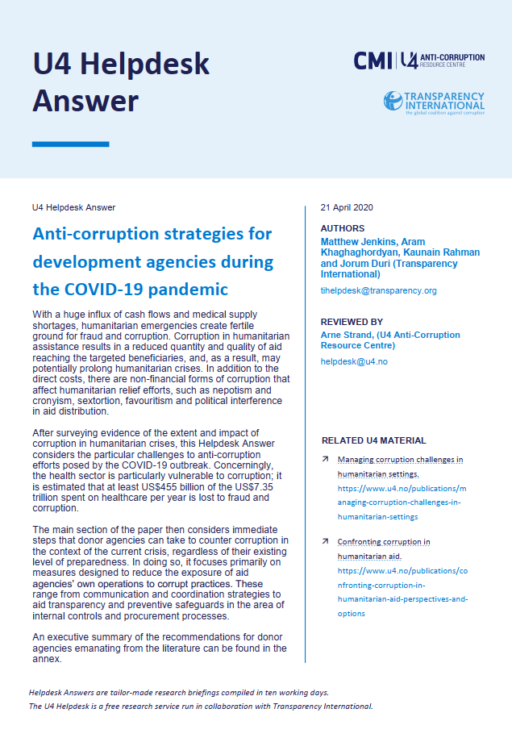- Home
- Anti-Corruption Helpdesk
- Anti-corruption strategies for development agencies during the COVID-19 pandemic
Anti-corruption strategies for development agencies during the COVID-19 pandemic

This Anti-Corruption Helpdesk brief was produced in response to a query from a U4 Partner Agency. The U4 Helpdesk is operated by Transparency International in collaboration with the U4 Anti-Corruption Resource Centre based at the Chr. Michelsen Institute.
Query
In previous major humanitarian emergencies, what data is there that quantifies the amount lost to fraud and corruption, and/or demonstrates quantitatively the effect ‘good’ controls/measures can have? Please also summarise the anti-corruption measures development agencies can take.
Contents
- Introduction
- Direct costs
- Indirect costs
- Anti-corruption strategies for development agencies
- Anti-corruption and COVID-19
- Short-term measures
- Longer term measures
Main points
- Corruption in humanitarian assistance results in a reduced quantity and quality of aid reaching the targeted beneficiaries, which, as a result, could prolong humanitarian crises.
- Corruption is occasionally seen as a cost of doing business in humanitarian contexts, especially where there is a perceived trade-off between exigency and due diligence. Yet anti-corruption procedures and accountability mechanisms are some of the best instruments to ensure that humanitarian assistance is being used effectively and donors’ objectives are achieved.
- There are a number of immediate steps that donor agencies can take to tackle corruption in the context of the COVID-19 crisis, regardless of their existing level of preparedness. These range from communication and coordination strategies to aid transparency and preventive safeguards in the area of internal controls and procurement processes.
Summary
With a huge influx of cashflows and medical supply shortages, humanitarian emergencies create fertile ground for fraud and corruption.
Corruption in humanitarian assistance results in a reduced quantity and quality of aid reaching the targeted beneficiaries, and, as a result, may potentially prolong humanitarian crises. In addition to the direct costs, there are non-financial forms of corruption that affect humanitarian relief efforts, such as nepotism and cronyism, sextortion, favouritism and political interference in aid distribution.
After surveying evidence of the extent and impact of corruption in humanitarian crises, this Helpdesk Answer considers the particular challenges to anti-corruption efforts posed by the COVID-19 outbreak. Concerningly, the health sector is particularly vulnerable to corruption; it is estimated that at least US$455 billion of the US$7.35 trillion spent on healthcare per year is lost to fraud and corruption.
The main section of the paper then considers immediate steps that donor agencies can take to counter corruption in the context of the current crisis, regardless of their existing level of preparedness. In doing so, it focuses primarily on measures designed to reduce the exposure of aid agencies’ own operations to corrupt practices. These range from communication and coordination strategies to aid transparency and preventive safeguards in the area of internal controls and procurement processes.
An executive summary of the recommendations for donor agencies emanating from the literature can be found in the annex.
Caveat
Researching this paper has revealed that there is a dearth of literature on immediate and tangible steps development agencies can feasibly take to reduce the risks of corruption during humanitarian crises. Most studies on anti-corruption during emergency conditions instead primarily discuss the integrity infrastructure donors should establish before a crisis hits, such as developing surge capacity and streamlined procurement protocols.
While development agencies with pre-established crisis management measures are doubtless better placed to manage corruption risks in the field, putting these systems into place takes time, a precious commodity agencies are unlikely to enjoy during crisis situations. For this reason, this Helpdesk Answer distinguishes between pragmatic short-term measures that all donors can take regardless of their existing level of preparedness and longer term strategies to tackle corruption.
Another conceptual distinction can be made between measures designed primarily to reduce the exposure of aid agencies’ own operations to corrupt practices and broader good governance reforms donors can support state and non-state actors to implement in aid-recipient countries.
Authors
Matthew Jenkins, Aram Khaghaghordyan, Kaunain Rahman and Jorum Duri, Transparency International
Reviewer
Arne Strand, U4 Anti-Corruption Resource Centre
Date
21/04/2020
Tags
 Download PDF
Download PDF
